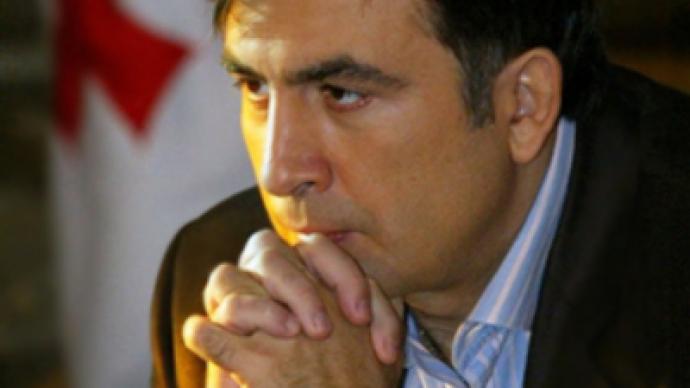‘Either you hold a referendum, or we’ll hold one for you’ – Georgian opposition

The Georgian opposition has presented President Saakashvili with an ultimatum: either he declares a referendum on a snap presidential election within ten days – or they will hold one themselves.
On Monday Georgia’s former UN Ambassador Irakly Alasania, who quit his post shortly after the five-day Georgia-South Ossetia war, has announced that a new political movement ‘Alliance for Georgia’ has been set up.
It unites Alasania’s team with other opposition groups – the New Rights party (leader David Gamkrelidze) and the Republican party (leader David Usupashvili).
“The alliance has been created as a strong alternative to the existing authority. Having wide support from the society, it will replace Saakashvili and his regime,” Russian news website Gazeta.ru quotes Alasania as saying.
Alasania has reminded that the referendum is a constitutional right of the country’s citizens and added his team will use all possible means, including international monitoring, not to let falsify the results of the referendum.
“This will be a hard fight and we are ready,” Alasania said.
The leader of another Georgian opposition party, former Foreign Minister Salome Zurabishvili, has delivered another ultimatum to Saakashvili. She has demanded that he resigns by April 9.
“If Saakashvili doesn’t do that, the opposition forces will call the Georgian people to hold a rally, and rallies in all big cities won’t end until he steps down,” Zurabishvili said.
Another opposition party, Democratic Movement – United Georgia, also insists that Saakashvili steps down by April 9.
Its leader Nino Burdzhanadze, the former speaker of Georgia’s parliament, says the only way to topple the president is a mass public protest. She adds that her movement has finished the first stage of consultations with other opposition forces and if Saakashvili doesn’t resign, non-stop protest rallies will leave him no other choice.
Though Burdzhanadze calls for early presidential election, she warns that a referendum or snap parliamentary elections would turn the vote “into the same farce as in 2008”.
“A referendum is a long process,” she says. “In accordance with the Georgian legislation, it may last up to a year. And even if it is held, I’m sure its results will be rigged by the authorities.”
Burdzhanadze has expressed hope Irakly Alasania and his allies will share her position.
Earlier 12 main non-parliament opposition parties and movements and a former presidential candidate Levan Gachechiladze signed a declaration demanding Saakashvili’s resignation, holding a snap presidential poll and improving the country’s electoral system.
The signatories included the alliance of the Republican and the New Rights parties, The United Opposition (the Conservative party, People’s Party and the Movement for United Georgia), Nino Burdzhanadze’s Democratic Movement – United Georgia party, Freedom Party,
Georgia’s Way party, Women’s Party, Green Party, Georgia’s Traditionalists and Industrialists’ parties. The Labour Party has orally expressed its consent with the document.
Meanwhile, Saakashvili has announced he is not going to resign until the end of his term in office in 2013.
The Georgian political landscape
Georgia’s leading party is Mikhail Saakashvili’s ‘United National Movement’. With 119 seats out of 150, it controls the parliament and the country’s government.
The remaining 31 seats in the Georgian parliament are distributed as follows:
- The United Opposition & the New Rights bloc have 17 seats,
- Labour Party has six seats,
- The Christian-Democratic Movement (leader Georgy Targamadze) has six seats,
- The Republican Party has two seats.
The Georgian opposition’s main problem is that up to the present day it has not managed to unite. Plenty of opposition parties – long-lasting and recently-formed ones – are constantly active, forming alliances and splitting again.
So far, the most successful attempt to unite has been the creation of the United Opposition block in 2007 which included ten parties:
- The Conservative Party (leaders Kakha Kukava, Zviad Dzidziguri),
- The Republican Party (leader David Usupashvili),
- The Labour Party (leader Shalva Natelashvili),
- Georgia’s Way party (leader Salome Zurabishvili),
- On Our Own movement (leader Paata Davitaya),
- Freedom movement (leader Konstantin Gamsakhurdia),
- Movement for United Georgia (leader Irakly Okruashvili),
- People’s Party (leader Koba Davitashvili),
- Kartuli Dasi (leader Dzhondi Bagaturiya),
- The National Forum (leader Kakhaber Shartava).
Nevertheless, the bloc’s presidential candidate Levan Gachicheladze failed to win the presidential election in January 2008. Officially, he trailed a long way behind triumphant Mikhail Saakashvili. The opposition has never admitted that the election result was fair.
At the parliamentary election in May 2008 the bloc was joined by the New Rights party but saw the Republican and the Labour parties leaving.
Since then the nine-party alliance split, with only three parties remaining – the Conservative Party, People’s Party and the Movement for United Georgia.
At the moment the only other opposition alliance in Georgia is the union of the New Rights party, the Republican party and Irakly Alasania’s group.
So far other parties are working on their own.













